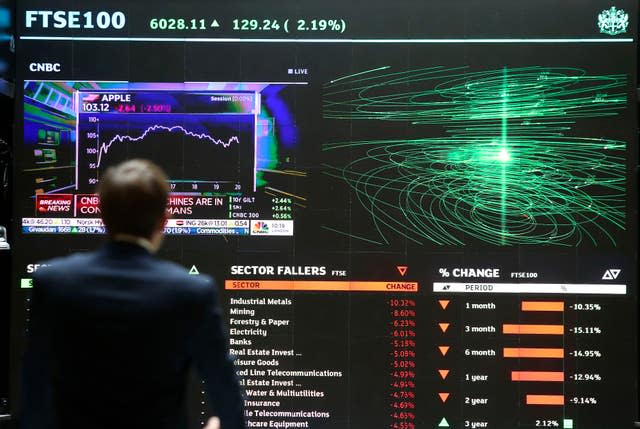UK’s top stock market index celebrates 40th anniversary
The FTSE 100 is celebrating its 40th anniversary, as firms from Barclays to Sainsbury’s remain a fixture of the UK’s top stock market index.
Dubbed the Footsie, the index containing the biggest 100 companies on the London Stock Exchange (LSE) launched on January 3 1984.
It was widely considered a measure of the UK’s stock market and a gauge of the health of the wider economy.
It holds constituents with a combined value of £1.9 trillion, more than 11 times higher than the £165.6 billion market capitalisation which was first available in 1986, according to the LSE’s analytics subsidiary FTSE Russell.
The index today contains 26 companies which featured during the 1984 launch, including major banks Barclays and Lloyds, retailers Sainsbury’s and Tesco, as well as tobacco giants British American Tobacco and Imperial Brands.
Some, such as Marks & Spencer, left the FTSE 100 at some point, being relegated to a lower index before bolstering their share price and returning at a later date.
Investment experts have weighed on the FTSE 100’s performance over the past four decades, amid criticism it has languished in comparison to international peers.

Laith Khalaf, head of investment analysis at AJ Bell, said: “The headline index has made almost no progress since the start of the century, and in the last decade the Footsie has been totally eclipsed by the US stock market, which is winning company listings and financial flows.
“Since 2016, domestic investors have been relentlessly selling UK equity funds in favour of more global offerings, no doubt driven in part by better performance from overseas equities.”
The US’s top stock market index, the S&P 500, contains giants including Apple which has a market capitalisation of nearly three trillion US dollars, more than the entire FTSE 100.
The FTSE 100’s score has risen 654% over the past four decades, from 1,000 points at launch to about 7,730 on the last trading day of 2023.
It has outperformed gold and UK government bonds which have risen by 419% and 70% respectively over the same period, FTSE Russell found.
The index also hit a milestone in mid-February when it surpassed the 8,000 point mark for the first time.
But Mr Khalaf pointed out that most of the FTSE’s growth occurred in the first two decades of its existence, adding: “An idyllic youth has given way to an austere adulthood for the UK’s headline index.
“Since 2000, the headline FTSE 100 has festered, while other developed market indices appear to have forged ahead.
“From the turn of the century, the FTSE 100 has risen by just 0.4% a year on average, compared with a 6.1% annualised rise in the value of the S&P 500.”
According to data from Morningstar and AJ Bell, the index has produced a total return of 4.1% per year since 2000, crucially taking into account dividends paid out by companies and reinvested during that time.
Mr Khalaf said the data painted a more “healthy” picture, “though the UK still languishes well behind its US and European counterparts”.
But experts have suggested there is more hope on the horizon for the FTSE, which could benefit this year from inflation falling sharply and an upcoming general election.
Susannah Streeter, head of money and markets for Hargreaves Lansdown, said: “The resilience of UK consumers, and the underlying economy, may once again exceed expectations in 2024.
“Hopes of a soft landing for the US may also help the index, given the multinational makeup of companies which are reliant on strength in the global economy.”
Associated British Foods
Aviva
BAE Systems
Barclays
Barratt Developments
BP
British American Tobacco
GSK
Imperial Brands
Land Securities Group
Legal & General Group
Lloyds Banking Group
Marks & Spencer Group
NatWest Group
Pearson
Prudential
Reckitt Benckiser Group
RELX
Rio Tinto
Sainsbury (J)
Shell
Smith & Nephew
Standard Chartered
Tesco
Unilever
Whitbread


